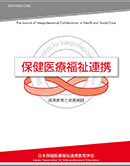Volume 14, Issue 1
Displaying 1-6 of 6 articles from this issue
- |<
- <
- 1
- >
- >|
-
2021 Volume 14 Issue 1 Pages 1
Published: 2021
Released on J-STAGE: December 02, 2021
Download PDF (479K) -
2021 Volume 14 Issue 1 Pages 2-11
Published: 2021
Released on J-STAGE: December 02, 2021
Download PDF (1426K) -
2021 Volume 14 Issue 1 Pages 12-22
Published: 2021
Released on J-STAGE: December 02, 2021
Download PDF (1063K) -
2021 Volume 14 Issue 1 Pages 23-26
Published: 2021
Released on J-STAGE: December 02, 2021
Download PDF (1166K) -
2021 Volume 14 Issue 1 Pages 27-29
Published: 2021
Released on J-STAGE: December 02, 2021
Download PDF (618K) -
2021 Volume 14 Issue 1 Pages 30-75
Published: 2021
Released on J-STAGE: December 02, 2021
Download PDF (1091K)
- |<
- <
- 1
- >
- >|
